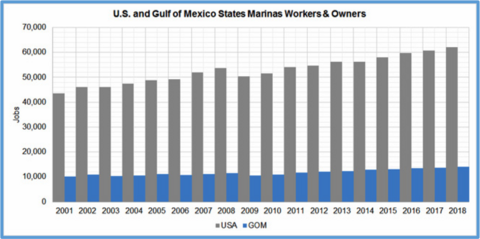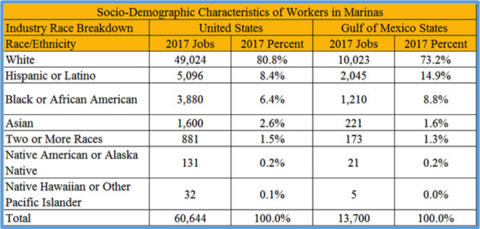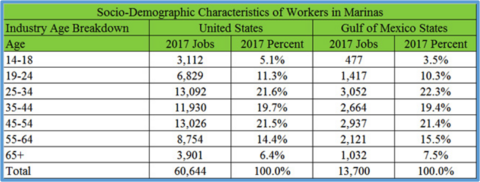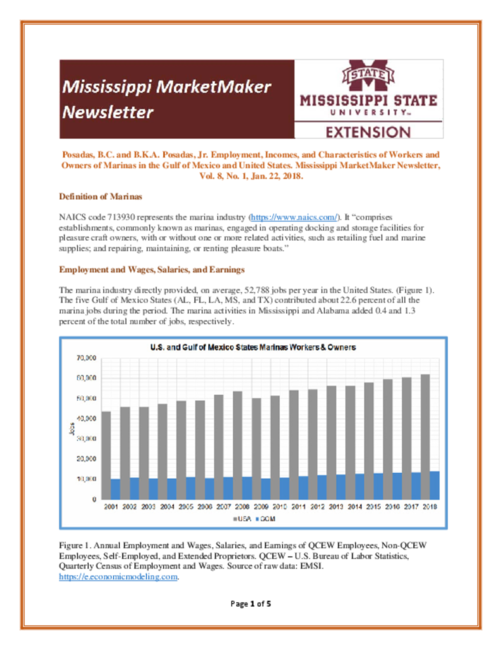Mississippi MarketMaker
Vol. 8 No. 1 | Marina Workers
Employment, Incomes, and Characteristics of Workers and Owners of Marinas in the Gulf of Mexico and United States
Posadas, B.C. and B.K.A. Posadas, Jr.
Definition of Marinas
NAICS code 713930 represents the marina industry (https://www.naics.com/). It “comprises establishments, commonly known as marinas, engaged in operating docking and storage facilities for pleasure craft owners, with or without one or more related activities, such as retailing fuel and marine supplies; and repairing, maintaining, or renting pleasure boats.”
Employment and Wages, Salaries, and Earnings
The marina industry directly provided, on average, 52,788 jobs per year in the United States. (Figure 1). The five Gulf of Mexico States (AL, FL, LA, MS, and TX) contributed about 22.6 percent of all the marina jobs during the period. The marina activities in Mississippi and Alabama added 0.4 and 1.3 percent of the total number of jobs, respectively.

The combined wages, salaries, and proprietor earnings (at constant 2017 prices) of all the QCEW employees, non-QCEW employees, self-employed, and extended proprietors averaged $34,292 per person (Figure 1). The annual pay of workers and owners in the five Gulf of Mexico States averaged $35,149 per person or 102.7 percent of the national average. Mississippi and Alabama commercial workers and owners received average annual pay amounting to 66.3 and 87.1 percent of the national average, respectively.
Distribution of Workers and Owners by Gender
The most recent industrial overview released by EMSI (Jan. 2018) showed that among workers and owners, 53.6 percent were males (Figure 2). About 46.4 percent of the workers and owners were females. In the Gulf States, relatively more men worked and owned the marina businesses.

Distribution of Workers and Owners by Race or Ethnicity
The recent industrial overview disseminated by EMSI (Jan. 2018) also categorized the workers and owners by race or ethnicity (Figure 3). Majority of the workers and owners are Whites (80.8%), followed by Hispanic or Latino (8.4%), and African Americans (6.4%). In the Gulf States, relatively fewer Whites, more Hispanic and African Americans are engaged in the marina business.

Distribution of Workers and Owners by Age
The technical overview published by EMSI (Jan. 2018) also classified the workers and owners by age (Figure 4). More than two out of 10 of the workers and owners are 55 years old and above. The 45-55 years old workers and owners consisted of 21.5 percent of the total. The 35-44 years old group added 19.7 percent of the total. The younger workers and owners comprise the rest. The workers and owners in the Gulf States are relatively older than the national average.

Marinas Registered in MarketMaker
There are no marinas registered in MarketMaker. An online directory of marinas by state, e.g., Mississippi, can be found at https://marinas.com/browse/marina/US/MS. Marinas are where most of the local charter boats for-hire are docked.
If you need an online database of local charter-boats for-hire, you can perform the following search at the Mississippi MarketMaker (https://ms.foodmarketmaker.com/) or other member states (https://foodmarketmaker.com/):
States: AL, AK, AZ, AR, CA, CO, CT, DC, DE, FL, GA, HI, ID, IL, IN, IA, KS, KY, LA, ME, MD, MA, MI, MN, MS, MO, MT, NE, NV, NH, NJ, NM, NY, NC, ND, OH, OK, OR, PA, RI, SC, SD, TN, TX, UT, VT, VA, WA, WV, WI, or WY » Type: Tourism » Profile: Tourism > Fishing Charter
More than 1,000 local charter boats for-hire registered their business profiles in MarketMaker. Click this LINK to view the search results online. You can sort the results alphabetically, by relevance, or by the distance to your current location.
FREQUENTLY ASKED QUESTIONS
What is MarketMaker?
MarketMaker is the largest and most in-depth database of its kind featuring a diverse community of food-related businesses: buyers, farmers/ranchers, fisheries, farmers markets, processors/packers, wineries, restaurants and more. MarketMaker provides simple yet powerful search tools to connect with others across the production and distribution chain (http://ms.foodmarketmaker.com/).
Where can you find Mississippi MarketMaker?
MarketMaker is located at http://ms.foodmarketmaker.com/.
Ask Siri or Cortana to search for “Mississippi MarketMaker” on your smart phone.
How do you register your food business in Mississippi MarketMaker?
Click Register and type your email address and a password in the spaces under Register. Be prepared to enter information (and pictures) about your business.
What are the benefits in registering your food business in Mississippi MarketMaker?
Producers register their businesses in MarketMaker because food buyers of all types access our database to find products and services to meet their specific needs. Through MarketMaker, producers can reach more buyers and more efficiently form profitable business alliances.
How do you search for your business profile in Mississippi MarketMaker?
Click Search and type the name of your business in the space under Search MarketMaker.
How do you update your business profile in Mississippi MarketMaker?
Click Register and then click UPDATE YOUR PROFILE. Type your email address and password in the spaces under Account Login. Be prepared to enter updated information (and pictures) about your business.
MarketMaker Training Workshops
This training workshop is available upon request by a group of 6-12 producers, extension agents, state regulatory agencies staff and teachers. Each workshop will best fit the needs of the participants. Email Dr. Ben Posadas for details at ben.posadas@msstate.edu.
How do you search for local food businesses in Mississippi MarketMaker?
Click Search and type a keyword in the space under Search MarketMaker.
What is the Market Research tool of MarketMaker?
The MarketMaker research tool is an interactive mapping resource for identifying target markets, developing customized census profiles, and mapping food related businesses over demographic maps.
Where do you find the Market Research tool in MarketMaker?
Look for the Market Research section in MarketMaker and click Research your market now or Use previous version.
Download
Filed Under
Authors
-
Ben Posadas Extension/Research Professor

- CREC-Coastal Research & Ext Center
